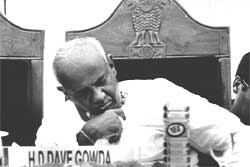The never green Gowda
 • Some people think that they are born only to protect the environment in this country and that God has sent them to this earth only to protect the environment... as if we are not interested in the environment." Prime Minister's (pm) statement at the meeting of state power ministers on October 16, 1996.
• Some people think that they are born only to protect the environment in this country and that God has sent them to this earth only to protect the environment... as if we are not interested in the environment." Prime Minister's (pm) statement at the meeting of state power ministers on October 16, 1996.
• pm speaking at Destination India Summit in New Delhi on September 10, 1996: "We want to see that the superhighways must be able to connect all major ports of the country. This is one of the major decisions which we are going to take also with regard to certain legislation about acquiring land which will ease the burden of the investor."
• Often people are being misled by environmentalists who tend to be anti-development... You are young... the provisions of the Forest Conservation Act (fca), 1980, and the Environment Protection Act (epa), 1986. But perhaps the most resounding bombshell came about after mid-August, 1996, when the government announced its decision to hand over clearances of power projects of up to Rs 1,000 crore to the states. This implied that projects could take off without the mef's clearance.
The artful dodger Praful Bidwai, columnist and member of the mef-appointed appraisal committee for river valley projects, notes that often the states' performance on issues like compensatory forestation in connection with major projects and clearing environmentally suspect mining projects had been tardy.
This does not mean that the pm is not an artful dodger. In early July, 1996, he used his 'rustic charm' to break Sundarlal Bahuguna's protest fast, assuring Bahuguna a review of the Tehri project. The rustic charm came handy again in dealing with Medha Patkar and a team of tribal ousters of the Sardar Sarovar Project. But the issue of reducing the Narmada dam's height is still hanging fire.
Regarding negotiations with the Narmada Bachao Andolan and the National Fishworkers' Federation, Gowda was supported by his coalition partners. But stooping too much to please industry may make him lose it. The Communist Party of India, for instance, has already sounded its reservations about Gowda's plans to amend the Land Acquisition Act, 1894 (amended in 1984). Said party general secretary A B Bardhan, "I am not with him on this move."
The recent shift-to-states decision has evoked mixed reactions from within the power and energy sectors as well. Bhaskar Natarajan, director, Energy Management Centre, New Delhi, said that in principle, the move was fine "as long as states have technical and humanpower support". However, R L Suri, former chairperson of the Haryana state electricity board, and fellow, Tata Environmental Research Institute, New Delhi, said the overburdened, mismanaged state departments can hardly bear any extra load. "Who has the government consulted while taking this decision? It seems to me that no thought has gone into preparing this plan," he grumbled.
Despite widespread adverse reactions, the much-delayed restructuring of the Central Water Commission had not been envisaged even in the Ninth Plan. In a feeble attempt to cap its apathy, the government recently set up a high-power commission for integrated water development which harangues about interlinking rivers, identifying priority projects, research and resource generation. However, issues like traditional water harvesting and smallscale projects go unmentioned, some committee members pointed out.
Is the law an ass?
Regarding Gowda's proposal for an amendment to the Land Acquisition Act, Bardhan says, "Already, industrialists and businesspersons are using legal loopholes to deprive local people of their land. It is a question of land for livelihood or land for business interests."
Rajiv Dhawan, Supreme Court environment lawyer, termed the proposed amendment as pernicious, observing, "The act contains valuable procedure to contest public interest aspect of any acquisition. As the government is seeking to gradually convert India into a wasteland of buildings and industry, it would now be necessary for activists to use this procedure more and more." He added, "Environmentalists must regard the government's move with suspicion, since they are being asked to mortgage their only opportunity to contest land acquisition demands."
Sashi Kantan, under secretary, ministry of mines, said that in a bid to "maintain the spirit of international cooperation in mining", the government has thrown open its doors to all and sundry. At Destination India, Gowda said that the Foreign Investment Promotion Board had cleared 350 projects in later part of 1996 alone.
Before the summit, of the several delegations that met the minister for mines and steel, an Australian delegation specifically demanded certain amendments to the Mines and Minerals (Regulation and Development) Act, 1957. Incidentally, a member of the delegation belonged to the firm Broken Hill Proprietary (bhp), whose detrimental mining activities in Papua New Guinea had ignited local protests. Says Christine Milne, leader, Green Party of Tasmania, "India should be vigilant to ensure that the companies operating here like the bhp, meet the highest environmental standards
